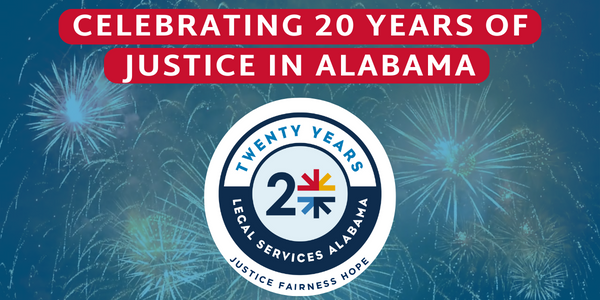2024 marks the 20th anniversary of the creation of Legal Services Alabama (LSA) – Alabama’s only statewide provider of free legal aid for people with low incomes.
In 2004, Alabama’s three existing legal services programs – Legal Services Corporation of Alabama (founded 1977), Legal Services of Metro Birmingham (founded 1977) and Legal Services of North-Central Alabama (founded 1969) – merged to form the statewide program Legal Services Alabama.
Prompted by a nationwide movement initiated by the Legal Services Corporation (LSC), the consolidation of the existing programs created a more efficient and effective experience for clients seeking legal aid. The merger made more resources available for legal services across the state and positioned the Alabama civil justice community to better provide equal access to justice for all. LSA is the only LSC-funded program in Alabama.
LSA is a refuge for low-income people who have nowhere else to turn. LSA offers legal help in four core service areas: Domestic Violence, Public Benefits, Housing/Foreclosure Prevention and Consumer Protection. Additional services include Heirs Property, Veterans Services, Elder Rights, Low-Income Taxpayer Clinic (LITC), Community Re-entry, Disaster Relief and community education. Over the years, LSA has played a crucial role in advocating for the rights of vulnerable populations, acting as a formidable force for justice in Alabama.
LSA serves all 67 counties in Alabama through eight regional offices and a statewide call center. Since 2004, LSA advocates have closed over 221,000 cases saving clients, communities and local municipalities over $280,000,000.
After two decades of providing quality legal services to Alabama, LSA is currently funding the construction of a new central office in downtown Montgomery to further expand the organization’s mission into the future.
The new downtown location honors LSA’s commitment to racial and social justice by providing clients access to necessary resources like public transportation, local courts, and a state-of-the-art technological call center that supports clients statewide.






